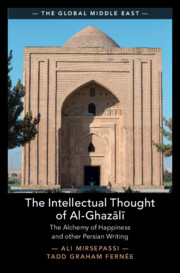Book contents
- The Intellectual Thought of Al-Ghazālī
- Reviews
- The Global Middle East
- The Intellectual Thought of Al-Ghazālī
- Copyright page
- Contents
- Acknowledgments
- Note on Transliteration
- Introduction
- 1 The Time and Life of Ghazālī
- 2 Reading Ghazālī in the West
- 3 The Poetic Imagination and the Politics of Ambiguity
- 4 The Troubled Orthodoxy in the Academic Study of Islam
- 5 A Path to Reform
- 6 A Cosmopolitan Reading of Ghazālī
- 7 Ghazālī’s Practical Ethics
- Bibliography
- Index
2 - Reading Ghazālī in the West
Published online by Cambridge University Press: 16 January 2025
- The Intellectual Thought of Al-Ghazālī
- Reviews
- The Global Middle East
- The Intellectual Thought of Al-Ghazālī
- Copyright page
- Contents
- Acknowledgments
- Note on Transliteration
- Introduction
- 1 The Time and Life of Ghazālī
- 2 Reading Ghazālī in the West
- 3 The Poetic Imagination and the Politics of Ambiguity
- 4 The Troubled Orthodoxy in the Academic Study of Islam
- 5 A Path to Reform
- 6 A Cosmopolitan Reading of Ghazālī
- 7 Ghazālī’s Practical Ethics
- Bibliography
- Index
Summary
The chapter reviews interpretations of Ghazālī’s thought prevalent in debates on political Islam, predicated on Islam’s encounter with the West and modernity, inquiring into Ghazālī’s relevance to contemporary Western conceptions of Islam. Participants consistently invoked Ghazālī in terms of his significance to rationalism. Ghazālī is either depicted as an enemy of Enlightenment or a precursor to postmodern critiques of modernity. We analyze three contemporary Ghazālī representations, including Salman Rushdie’s Two Years, Eight Months, and Twenty-Eight Nights (2015), Abdul Latif Salazar’s documentary Al-Ghazali: The Alchemist of Happiness (2004), and a 2010 academic conference on “The Rise of Intellectual Reform in Islam,” hosted by the CUNY Graduate Center featuring Baber Johansen, Ebrahim Moosa, Abdolkarim Soroush, and Talal Asad. We posit that Ghazālī was a reformer responding to a theologico-political crisis. Ghazālī’s The Alchemy of Happiness, written shortly before 1105 CE, and his dīn/dunyā distinction, separated universal truth from religious identity to secure the autonomy and validity of worldly knowledge crucial to the functioning of the Abbasid Empire.
- Type
- Chapter
- Information
- The Intellectual Thought of Al-Ghazālī , pp. 57 - 83Publisher: Cambridge University PressPrint publication year: 2024

